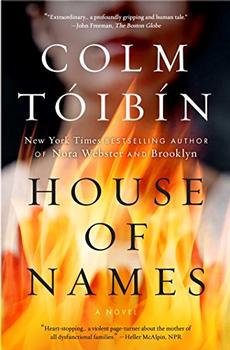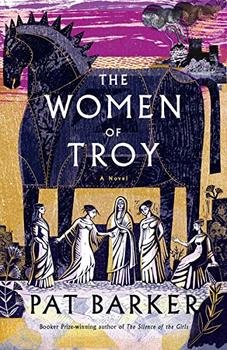Summary | Excerpt | Reading Guide | Reviews | Beyond the book | Read-Alikes | Genres & Themes | Author Bio

While she might be considered one of the most notorious women in Greek mythology and, perhaps, its greatest villain, Clytemnestra's story has rarely been told fully or in her own voice. In Colm Tóibín's novel, Agamemnon's wife finally gets her due and claims her space and voice as her betrayal, loss, and descent are told from her perspective, as well as that of her daughter, Electra and her son, Orestes.
House of Names reclaims and humanizes the story of Clytemnestra - daughter of Leda, half-sister of Helen, and wife of Agamemnon - who is tricked into bringing her younger daughter to be sacrificed to the gods so her husband and the Greek armed forces can win the Trojan War. Though some of the details are altered from both The Oresteia and The Odyssey where her story is told, the narrative weaves together layers of myths and epics that honor the historical, literary, and mythological traditions to which this story belongs.
Tóibín's retelling shifts from the perspective of Clytemnestra to Orestes, then to Electra, to Orestes, to Clytemnestra, and ending, finally, with Orestes again. All of the threads and perspectives are woven together so beautifully that the villainy and treachery become human and not diabolical. While I was originally skeptical about Tóibín's appropriation of a female "I" in the cases of both Clytemnestra and Electra, I found that by using the limited third person to write Orestes' chapters, along with these two first person perspectives, he firmly centralized the female voices. Rather than relegating them to the position of reactive, emotional actors, we are always aware of Electra and her mother's pain and betrayal, and we also see them as each other's foil; the same scheming, cunning drive for revenge and power sits within both of them, though directed at different people. We see, before they can, that they are likely to suffer the same end.
The contrast between the first and limited third person narratives also shows the limitations of Orestes' real power; despite being Agamemnon's son and heir, Orestes lacks real agency, especially in comparison to his mother and sister who manipulate their surroundings while decrying the ways they must find to hold on to power as women in a patriarchal society. Orestes's thoughts and motivations are somewhat a mystery to both himself and the reader; he remains lost, knowing what he should do, who he should be, but without the acumen to claim his space. For him, rank becomes meaningless; even the memory of Iphigenia, who accepted her role as a sacrifice at her father's bequest, despite being lured to slaughter with the promise of marriage, commands more respect and power over Clytemnestra and Electra than he does. Thus, Tóibín uses his narrative to subvert understood gender-based power structures in his retelling of the Greek tragedy.
What could have become a trite, overwrought, emotional depiction of "woman goes mad with grief, and is further corrupted by power" and, therefore, a backwards-looking cautionary tale, is, instead, presented as moving and human. Tóibín's narrative leads the reader to a place of compassion for these characters, and a better understanding of why darkness may come to reside in the human heart.
![]() This review was originally published in The BookBrowse Review in May 2017, and has been updated for the
March 2018 edition.
Click here to go to this issue.
This review was originally published in The BookBrowse Review in May 2017, and has been updated for the
March 2018 edition.
Click here to go to this issue.

If you liked House of Names, try these:

by Ferdia Lennon
Published 2025
An utterly original celebration of that which binds humanity across battle lines and history.

by Pat Barker
Published 2022
A daring and timely feminist retelling of The Illiad from the perspective of the women of Troy who endured it--an extraordinary follow up to The Silence of the Girls from the Booker Prize-winning author of The Regeneration Trilogy.
People who bite the hand that feeds them usually lick the boot that kicks them
Click Here to find out who said this, as well as discovering other famous literary quotes!
Your guide toexceptional books
BookBrowse seeks out and recommends the best in contemporary fiction and nonfiction—books that not only engage and entertain but also deepen our understanding of ourselves and the world around us.